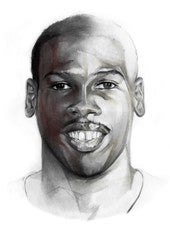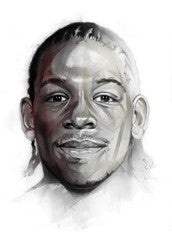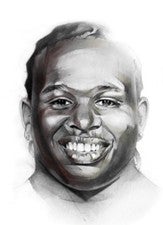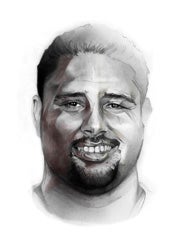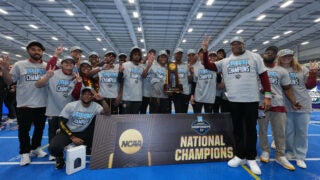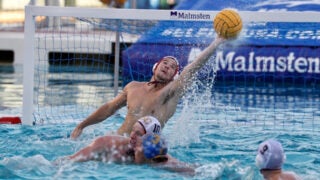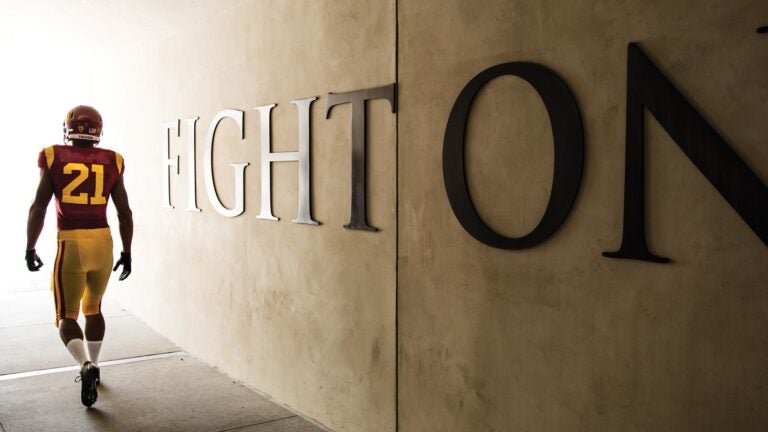
Football Stars Return to USC after the NFL
Every year, professional athletes head back to Troy to fulfill a promise: earning their USC degree.
It was his first day back as a USC student and Darnell Bing had come prepared—or so he thought. He had his backpack and laptop and even an iPad at the ready.
It had been five years since the All-American safety played his last snap for the Trojans in the 2006 BCS National Championship Game, and almost as long since he’d been in a USC classroom. The least he could do was arrive ready with the technological tools he figured were standard for today’s students.
Turns out the first tools he needed were the most low-tech of all—pen and paper—after a professor asked students to write an assignment by hand in class. Bing can only laugh now as he recalls the moment: Every gadget he owned, all for naught, as he meekly asked the student next to him to borrow basic writing utensils.
“I’d made an assumption, rather than coming prepared for everything,” he says. “I made an assumption that everything would be different.”
Every year, student-athletes like Bing ’13 return home to Troy to complete their degrees after leaving early to pursue a career in professional sports. Most of them come back from the NFL. Some, like Bing and his Trojan football teammates tight end Dominique Byrd ’15 and defensive tackle Shaun Cody ’15, do so after wrapping up their playing careers.
Others, like wide receiver Marqise Lee, miss as little as one semester before returning. What all come to discover, though, is that while their old school supplies aren’t obsolete just yet, the rest of what they thought they knew about college has changed.
Everything truly is different.
USC Textbooks Versus USC Playbooks
At some point, these returnees all face the same question. Some hear it from classmates or professors after they’ve been back for a while. Others field it patiently every time they walk across campus.
“A lot of people are like, ‘What are you doing here?’” says Lee, the first USC player to receive the Biletnikoff Award, which is given to college football’s best wide receiver. The subtext: “‘He’s in the NFL—it’s crazy that he’s back!’”
There are days when Lee doesn’t believe it himself. Two months removed from his 2014 rookie season with the Jacksonville Jaguars, the 23-year-old re-enrolled full time for the spring semester at USC Dornsife earlier this year, taking four classes as he pursues his degree in sociology. He expects to graduate next spring, but it won’t be easy.
“A degree can last forever and helps get a nice job after playing. I’ve got to get a degree to get the job I want. My main focus is helping as many kids as I can.”Marqise Lee
“There are days when I sit in class and I’m like, Qise, do you really want to finish?” he says. Although he took classes during the NFL offseason, the league never truly stops. The last month of the semester was brutal. He commuted back and forth to Jacksonville for organized team activities, which meant coordinating presentations and even a final exam with his professors based on the dates the Jaguars allowed him to be in LA. The days at USC were even more hectic. A typical college student might only spend five hours on campus during a busy day, but Lee’s average Monday went from 9 a.m. to 4:50 p.m. Class breaks were interspersed with tutoring and workouts at the John McKay Center to keep his body in game shape. As his Jaguars teammates were relaxing, Lee was taking on “the hardest thing ever.”
And to know Marqise Lee is to understand that words like these aren’t uttered lightly.
He is, after all, the player who withstood his family being broken apart by the court system, who lost one brother to gang violence and the other to prison, who bounced around foster homes before a teammate’s parents took him in. He’s well schooled in adversity, and that—more than anything—informed his decision to return to college. The degree is part of Lee’s plan to make sure other kids don’t have to live through what he experienced. He wants to work in and help reform the foster care system. And football is his means to that end.
“We do understand as players that it doesn’t last forever,” Lee says of the NFL. “A degree can last forever and helps get a nice job after playing. I’ve got to get a degree to get the job I want. My main focus is helping as many kids as I can.”
So Lee toils away. It helps that two of his former teammates who turned pro, wide receiver Robert Woods and running back Silas Redd, are in school with him. Back in their Trojan football days, they were part of a nine-man crew that lived in a house they affectionately refer to as The Palace. That well-worn piece of real estate on 25th Street molded those football players into a brotherhood. And, as brothers are wont to do, they live to compete with one another. Three of these teammates and housemates had already graduated by the time Lee, Woods and Redd went to the NFL. No longer able to compete every day on Howard Jones Field, those former players instead threw down an academic gauntlet: Get your degree, and get on our level.
Lee is all too happy to oblige.
“My mind-set is, if those three got it, it’s mandatory,” he says. “It’s all competition, really. I went through school all the way from kindergarten, elementary—I’m not about to waste my time. I’m going to finish. It’s competitive within yourself.”
Focusing Off the Field
Because he’s early into his playing career and was so recently the most recognizable student-athlete on campus, Lee is easily spotted. He’s always greeted warmly, sometimes by people he knows and sometimes by others who only know of him. Most know little about his ambitions to reform the foster care system. Instead, he’s a man who gets paid to catch footballs, and he did that better than maybe anyone else who ever wore cardinal and gold. In their eyes he’s an athlete before anything else. Sometimes, that’s all they think he is. It’s not what he’d prefer, but he understands that comes with the territory. “It’s what you sign up for,” Lee says.
“I think everyone wants to be known as an individual… and not just be glorified for everything you do on the field.”Darnell Bing
There is no defined out-clause on that agreement, though, no pact dictating when football becomes tangential to an athlete’s public identity. It’s a balancing act that Lee won’t have to attempt so long as he’s playing in the NFL. But for players like Bing, Cody and Byrd, who returned to USC after their playing days were over, defining a new identity is one of the core challenges of being back on campus. That’s especially true when, in their minds, what they did between the hash marks can get in the way of being recognized for who they want to become.
“I wish people took us seriously,” Bing says. “Obviously, when we were here and playing really well, that was the talk of the town. But just to see us as regular individuals I think is more important than worshipping us as an athlete. I think everyone wants to be known as an individual at some point in time and not just be glorified for everything you do on the field.”
“I really feel that there’s a label placed on guys that they aren’t smart or they are ‘only’ football players,” echoes Byrd, who graduated with a bachelor’s degree in African-American studies. “I have been more resentful of that than anything.”
The first recourse, then, is to try to blend in. Bing, who is now pursuing his master’s in education, would regularly try to throw undergrads off the scent by claiming that he worked in real estate, even soliciting another student to help him sell the cover story. Cody, by his own admission, tries to “dress as young as possible,” always making sure to pull the brim of his hat low to avoid detection. Invariably, those attempts break down. As Byrd puts it, “It’s kind a hard to [hide when you’re] 6-foot-3 with a bunch of tattoos and they’re going, ‘Hmmm, there’s something that you do.’”
On the day he signed his USC letter of intent, DOMINIQUE BYRD promised his mother he’d earn his degree.
What these young men have come to realize, however, is that their concerns are mostly unfounded in their second term as students. For starters, most of their new classmates hadn’t even hit puberty during their run on Pete Carroll’s dynasty teams in the 2000s. More than that, the gulf between these young men and their classmates has shrunk because, functionally speaking, there no longer is one. They’re not the guys who their fellow students cheer at the Coliseum. They’re not the ones who are exhausted before class because they got up at 6 a.m. for workouts. They are regular students, in class for the same reason as their classmates.
“It’s easier because I chose,” Byrd says. “I chose to want to do well, and I have a choice to come back or not. Being an adult and having choices, and choosing for self-betterment, is always rewarding.”
There’s also the matter of simply being more alert now, without the grind of football wearing them down. “I was in class with some of the guys on the team, and I could see how tired they were,” says Cody, who walked through commencement in May and has two classes left to complete his degree in sociology. “They’re just dragging through class. I put myself back in that position of how tough it is as a student-athlete…and it made me appreciate that much more what it’s like to be ‘normal.’ It really gave me more of an opportunity to dive into my studies versus cramming or trying to get by as fast as possible.”
The greatest gains, though, come through simple maturity. Byrd believes that was the case for him especially—someone who was smart enough to keep up in classes during his college football career but who treated school less as its own experience than as a means to play football and live in Los Angeles. “Your focus is definitely different as a young man,” he says, than it is when you are building a family. When he returned to school at age 29, he was determined to be a different student than he was at 19—determined to be better.
“When you’re in class with 13 people or nine people and you didn’t do the reading, it’s not cool not to know what people are talking about,” Byrd says. “When you’ve done the reading and work, when you’re able to articulate what you think, the reward is instant.”
He pauses before revealing his ultimate conclusion, the last one so many would expect to come from a bruising tight end.
“It’s cool to be smart.”
SHAUN CODY thought about what it would mean to put on a cap and gown and hear his name called. Not just for himself, but also for his daughters.
Looking Beyond Themselves
The road to the graduation stage doesn’t wind much longer than Shaun Cody’s. He’s on solid financial footing after eight years in the NFL and is carving out a successful second career for himself in media, a field far removed from his studies in sociology. At 32, he could have decided that he was too old to go back to school.
But like every student, Cody thought about what it would mean to put on a cap and gown and hear his name called. Not just for himself, but also for his daughters. He has three and he wants them to earn college degrees someday. It wouldn’t feel right to ask them to do something he didn’t accomplish on his own, he says, not when he had the time to do it and the backing of the Trojan Athletic Fund to reimburse the remainder of his original football scholarship.
“I really wanted to set an example for my family and say I might not have finished this first go around, but I’m going to finish this sucker up,” Cody says. “It hopefully leaves that imprint in their mind: ‘Hey, I’d like to graduate from a school one day.’”
It turns out this is one of the greatest commonalities among these former pro players: They all came back for someone other than themselves. Byrd is the son of a single mother who made him promise on the day he signed his letter of intent with USC that he would one day earn his degree. Bing completed his bachelor’s in 2013 and now tutors current student-athletes in the John McKay Center. He wants his master’s so he can continue to serve as a big brother to the next generation of players.
“Being that we’ve been in the shoes that they want to go in, I basically try to help them see the bigger picture in life,” Bing says. “If you play 10, 15 years, great. If you don’t, great—you still have an education to fall back on. You’re at a tremendous university where they’re willing to help you out in whatever circumstances you’re in.”
“It’s always great to see these former student-athletes come back to campus with a renewed focus.”
Magdi El Shahawy, senior associate athletic director and director of USC Student-Athlete Academic Services, says he’s seen Trojans move back to LA and enroll at USC 10 years or more after leaving for the pro ranks—and that sets an example.
Lee has one more year to go before he dons cap and gown, but he already imagines what that day will feel like. He’s acutely aware of how many people are responsible for helping him get this far: his mother, Toy; the couple who informally adopted him in high school, Steven and Sheila Hester; his siblings; and too many coaches and teachers to mention. Without even one of them, he knows he might have wound up in the same position as one of his brothers. He wants to see the looks on their faces when he finally gets his degree in his hands.
“I always think about that—I know they’ll be stoked!” he booms, with a big laugh. “My mom and Miss Sheila will probably be crying tears of joy. That’s what I look for, showing that I’m on the right path to the things I will be doing. School is something I’ve got to finish.”
When that day comes, Lee will be one of thousands of students to cross the stage. After his detour to the NFL, he’ll be crossing the same goal line as the scholars surrounding him: becoming a graduate of USC.

